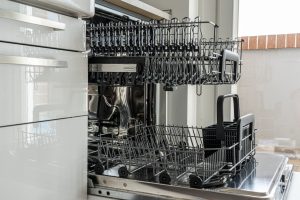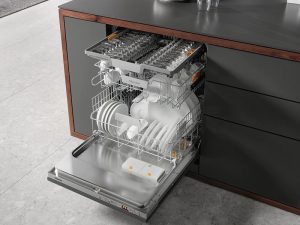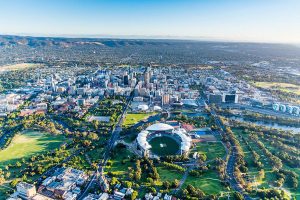It’s a chilly winter evening in Melbourne, and you’ve just returned home from a muddy football match. Your uniform is soaked and dirty, and you have another game early tomorrow morning. You toss your uniform into the washing machine, but then you remember – your old dryer has been acting up lately. Will it dry your uniform in time for tomorrow’s match?
This scenario is all too familiar for many Australians. A reliable dryer is crucial, whether sports uniforms, work clothes, or just the daily laundry load. But with so many options on the market, how do you choose or buy clothes dryer?
Consider the type of dryer that suits your needs and home setup. Vented dryers are common and affordable, but they require a venting system. Condenser dryers are more versatile and don’t need venting, but they are slightly more expensive. Heat pump dryers are the most energy-efficient, saving you money in the long run but have a higher upfront cost.
Before buying a clothes dryer, think about the features that are important to you. Do you want a dryer with a moisture sensor that automatically shuts off when clothes are dry? Or perhaps a model with a variety of drying cycles for different fabrics?
Performance is another key factor. Look for a dryer that dries clothes quickly and evenly, and consider energy efficiency to save on utility bills. If you frequently wash large items or have a big family, a larger-capacity dryer may be a good choice. Buying a dryer is an investment, not just a purchase. With this buying dryer guide, you can make an informed decision and find the perfect dryer for your needs.
How to Choose a New Dryer Here in Australia
Type of Dryer
Choosing the right type of dryer is the first step in your buying dryer journey. Three main types of dryers are available in Australia: vented, condenser, and heat pump. Vented dryers are the most common and affordable but require a venting system to expel hot air outside. Condenser dryers, on the other hand, convert the steam back into water and collect it in a container. They are more versatile in terms of placement but can be more expensive. Heat pump dryers are the most energy-efficient, using refrigeration to dry the clothes. They are more expensive upfront but can save you money in the long run with lower energy costs.
Features
Modern dryers come with various features designed to improve performance and convenience. These include moisture sensors that automatically shut off the dryer when clothes are dry, reducing wear and tear on your clothes and saving energy. Other features include noise dampening, a brightly lit control panel, a drum light, and various drying cycles to handle different fabrics and garments.
Performance
Performance is a key factor to consider when buying a new dryer. Look for a model that dries clothes quickly and evenly. Energy efficiency is also an important aspect of performance. Energy Star-certified dryers use 20% less energy than standard models, saving you money on your utility bills. Heat pump dryers are the most energy-efficient dryer, using up to 60% less energy than conventional dryers.
Capacity
The capacity of your dryer should match your washing machine’s capacity. This lets you move your laundry directly from the washer to the dryer. Most people only wash around 3.5 kg of laundry at a time, regardless of the size of their washing machine. However, you may consider a larger capacity dryer if you have a large family or frequently wash items like comforters or blankets.
Additional Things to Consider
Before making your final decision to buy clothes dryer, consider a few additional things. First, consider the cost of installation. Some dryers require professional installation, especially gas models. Second, consider the noise level. If your dryer will be located near your living or sleeping areas, you may want to look for a model with noise-dampening features. Finally, before buying a clothes dryer consider the warranty and service options. A good warranty can provide peace of mind, and convenient service options can make it easier to repair your dryer if necessary.
Questions to Answer Before Buying a New Dryer
What’s your budget for a new dryer?
The cost of a buying a clothes dryer depends on its type and features. Electric dryers are generally cheaper, ranging from $250 to $1,550, while gas dryers are slightly more expensive. Heat pump dryers, which are energy-efficient, start at around $800 but may have a higher initial cost.
Are you opting for a gas or electric dryer?
The choice between gas and electric dryers depends on the utilities available in your home. If you don’t have a natural gas supply, an electric dryer is suitable. However, if you have a gas supply, a gas dryer can be more energy-efficient and provide faster heating than an electric dryer.
How important is energy efficiency to you?
If energy efficiency is a priority for you, a heat pump dryer or an Energy Star-certified dryer is worth considering. These models consume less energy than standard dryers, resulting in long-term cost savings. However, they might have a higher upfront price compared to conventional models.
Do you need a heat-pump dryer?
Heat pump dryers are known for their energy efficiency and gentle clothes treatment. Although they offer these advantages, they are also more expensive. Investing in a heat pump dryer could be a wise choice if you frequently use a dryer and want to minimize energy consumption.
Are you looking for a dryer in a specific colour?
Dryers are available in various colours, ranging from vibrant shades like electric blue and ruby red to metallic carbon. However, coloured models often come with a higher price tag, typically costing $100 to $200 more than plain white models.
What’s the suitable size for your home?
The dryer size you need depends on the available space in your home and your laundry requirements. Standard dryers are usually 27 to 29 inches wide. If you have limited space, you may want to buy clothes dryer like a compact dryer or a stackable washer-dryer set. The drum capacity should be double that of your washing machine for optimal drying.
What essential features do you need?
Essential features include a moisture sensor that automatically stops the dryer when the load is dry, noise dampening for quiet operation, a well-lit control panel, and a drum light. An NSF-certified dryer can eliminate 99.9% of certain household bacteria, promoting better hygiene.
Are you willing to pay for extras?
Extra features such as removable dryer racks, stainless steel drums, Wi-Fi connectivity, and variable settings for time and temperature can enhance convenience and functionality. However, they can also increase the price of the dryer. Consider whether these additional features are worth the extra cost for your needs before you buy clothes dryer.
Who will install your new dryer?
The installation process can be complex, particularly for gas dryers that require a licensed plumber to install a gas line who are also expert in dryer repair services in Adelaide. Electric dryers may need a dedicated 220-volt circuit, requiring a licensed electrician’s assistance. When buying a dryer, consider the potential installation costs associated with your chosen type of dryer.
How will you dispose of your old dryer?
When you plan to buy clothes dryer, consider how to dispose of your old one. Some retailers offer trade-in deals or recycling programs for old appliances. Alternatively, if your old dryer is still in good working condition, you might consider donating it to a local charity to extend its useful life.
Final Thoughts
Choosing the right clothes dryer is essential for Australians who want efficient and reliable laundry drying. With the wide variety of options available in the market, it’s important to consider factors such as the type of dryer, features, performance, and capacity before you buy clothes dryer. Vented dryers are common and affordable, while condenser dryers offer more flexibility in placement. Heat pump dryers, although more expensive up front, provide long-term energy savings. Features like moisture sensors, noise dampening, and various drying cycles enhance convenience and performance.
Achieving optimal performance entails fast and uniform drying and energy efficiency to minimize utility expenses. It is important for the dryer’s capacity to align with the washing machine, with larger-capacity dryers ideal for bigger families or handling bulkier items. Additionally, factors such as installation specifications, noise levels, warranty coverage, and the proper disposal of old dryers should be considered before buying a clothes dryer. By considering all these factors and answering the relevant questions, Australians can make an informed decision and find and buy clothes dryer to meet their needs.



